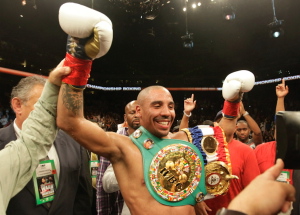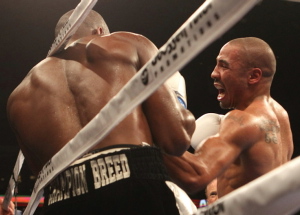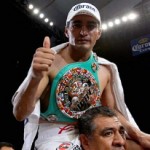The Verdict is in, Ward is the Heir
 OAKLAND, CALIFORNIA — In another virtuoso performance, unified super middleweight champion Andre Ward thrilled his local following in dismantling reigning recognized light heavyweight champion Chad Dawson with a tenth-round stoppage at the Oracle Arena on Saturday night. With the win, and the way in which he claimed it, Ward must now be considered the obvious choice to eventually succeed Floyd Mayweather Jr. as the pound-for-pound king.
OAKLAND, CALIFORNIA — In another virtuoso performance, unified super middleweight champion Andre Ward thrilled his local following in dismantling reigning recognized light heavyweight champion Chad Dawson with a tenth-round stoppage at the Oracle Arena on Saturday night. With the win, and the way in which he claimed it, Ward must now be considered the obvious choice to eventually succeed Floyd Mayweather Jr. as the pound-for-pound king.
After a calculated first round, Ward (26-0, 14 KOs) of Oakland completely took over the fight by the end of round two. At the close of the second stanza, Dawson (31-2, 17 KOs) of New Haven, Connecticut walked back to his corner with a cut over his right eye – the result of a headbutt.
Early in the third, Ward, 168, landed a right lead, followed by a short left that dropped Dawson, 168, for the first of three times in the fight. Dawson got up and began to return fire immediately. Ward landed a couple more hard shots, before Dawson offered back.
Though Dawson looked to have a clear head as the third came to a close, a left in close early in the fourth dropped the WBC Light Heavyweight titleholder again. Though Ward tripped, referee Steve Smoger correctly ruled the knockdown on Dawson. Ward unloaded a heavy arsenal, pressuring Dawson around the ring, but the glassy-eyed light heavyweight champion managed to make it out of the round. Ward may have been a bit winded just as Dawson was ready to go, but it would end up being a moot point.
Dawson looked almost refreshed by the end of the fifth, but Ward punctuated the round with another awkward hard left. Ward opened the sixth back behind his jab, walking down Dawson. The world’s leading 175-pounder could only manage to throw one at a time, which will never get you back into a fight with Andre Ward.
 After taking some of the seventh round off, Ward punished Dawson in the seventh, most notably landing two left uppercuts that looked to have knocked some brain matter out of the left hander’s mouth, while the Oakland native had his back to the ropes.
After taking some of the seventh round off, Ward punished Dawson in the seventh, most notably landing two left uppercuts that looked to have knocked some brain matter out of the left hander’s mouth, while the Oakland native had his back to the ropes.
Ward again staggered Dawson in close early in the eighth. Dawson came back with two lefts, one an uppercut, but the wind was clearly out of the southpaw’s sails. When the bell sounded to end the round, Dawson slowly walked back to his corner a defeated-looking fighter.
With the writing on the wall at the end of the ninth, Dawson’s corner opted to send their man out for round ten, rather than call it a night. The move just allowed Ward to land another hard left at range, followed by a right hand. The combination touched off a flurry that dropped Dawson for the third time. Referee Steve Smoger took his time and gave Dawson a good look. Reportedly, Dawson told Smoger, ‘We’re done.’ Smoger waved off the fight at 2:45 of round ten. With the win, Ward retained his WBA and WBC 168-pound titles and opened the door to numerous, mouth-watering possibilities.
In a shockingly quick performance, Antonio DeMarco (28-2, 21 KOs) of Tijuana, Baja California, Mexico successfully defended his WBC Lightweight title with a first-round stoppage over WBC #15 ranked John Molina Jr. (24-2, 19 KOs) of Covina, California.
DeMarco, 134 ½, landed a stiff jab that managed to send Molina, 134 ½, reeling across the ring, eyes unclear. Sensing his man was in some trouble, DeMarco pressed Molina into a neutral corner and flurried him into a hunched over position. Instead of making the decision to take a knee or fire back, Molina simply covered up in an unprotected posture, which really left referee Jack Reiss no choice but to stop the fight. Time of the stoppage was 44 seconds of the opening round.
In the last fight before HBO went on the air live, Malik Scott (35-0, 12 KOs) of Philadelphia, Pennsylvania scored a rare stoppage due to an injury to the left arm of Bowie Tupou (22-2, 16 KOs) of Los Angeles, California by way of Nukualofa, Tonga in a fight the Philadelphian controlled from minute one.
Unsurprisingly, Scott, 226, kept his distance in the opening round, staying behind his jab and keeping the shorter-armed Tupou, 260, out of his own punching range. Try as he might, Tupou kept looking for openings as the fight progressed into the middle and late rounds, but the defensive-minded Scott refused to open up or give him a sizeable target. Seconds into the eighth and final round, Tupou complained of pain in the area of either his left elbow or bicep and referee Ray Balewicz waved off the fight at 52 seconds.
2000 U.S. Olympian Ricardo Williams Jr. (20-3, 10 KOs) of Cincinnati, Ohio kept breath in his up-and-down career with a six-round majority decision over Anthony Lenk (14-2, 7 KOs) of Las Vegas, Nevada.
Williams, 143 ½, really deserved a unanimous score as he was clearly the harder and more effective puncher throughout the fight. The game and durable Lenk, 143 ½, must have won over one judge with his heart and determination to earn an even card.
After boxing his way through the first three rounds, Williams ramped up and seemed to hurt Lenk in the third. By the start of the fourth, Williams felt comfortable enough to stand and trade in spots with the still forward-moving Lenk.
At the end of the fifth, the former Olympian really sat down on his punches and had Lenk in some trouble as the final bell sounded. Perhaps frustrated by the the direction of the fight, Lenk let one go after the bell that did not seem to bother Williams. Though he was not really in the fight, Lenk had one of his better rounds in the sixth, but it was too little too late for the Nevadan. In the end, two judges had the fight 58-56 twice for Williams and one even at 57-57.
Franklin Lawrence (18-2-2, 13 KOs) of Indianapolis, Indiana remained busy, but failed to impress the slow-arriving crowd with a stoppage win over journeyman Homero Fonseca (9-6-3, 2 KOs) of Pearsall, Texas. Lawrence, 233 ½, pecked and jabbed his way through seven full rounds, but never really committed to making a statement in the night’s opening contest. Fonseca, 253, winged the occasional hook, but was never really in the fight. With swelling around his left eye and no hope really in turning around the contest, referee Edward Collantes opted to stop the bout just before the start of the eighth round.
In the first of two walkout bouts, Tony Hirsch (13-5-2, 6 KOs) of Oakland pleased the group of Bay Area fight fans that stuck around with a free-swinging four-round unanimous decision over tough Roberto Yong (5-6-1, 4 KOs) of Sacramento, California.
Hirsch, 157, who must have been inspired by what Ward had just accomplished before him, came out and seemed to want to put Yong, 158 ½, on his back. However, Yong has continually proven to be a tough cookie for everyone he has shared a ring with and Saturday proved to be no different. Just to let Hirsch know he was in a fight, Yong landed a hard right just before the final bell. However, all three judges had the fight for Hirsch, 39-37 and 40-36 twice.
In a fight that deserves more space than can be afforded to a walkout bout, Randy Guerrero (0-0-1) of Gilroy, California and Juan Urbina (0-0-1) of Santa Ana, California slugged it out with all they had for four rounds en route to a majority draw. Guerrero, 124, seemed to take round one with his early apparent edge in power. Urbina, 119, came right back in round two and landed some hard shots that likely took round two. Over the next two rounds it would be hard to choose who did the most damage, as both did plenty. In the end, one judge had Guerrero ahead, 39-37, but was overruled by the other two who had it even, 38-38. Though the hometown crowd wanted a Guerrero win, it was the type of fight no one deserved to lose.
Photos by Alexis Cuarezma
Mario Ortega Jr. can be reached at ortega15rds@lycos.com
